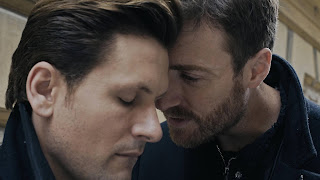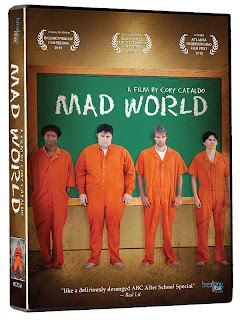VOD Review - Drown
Dean Francis is an Australian filmmaker whose signature short film Boys Grammar is about a young, gay man who is bullied and violated in a very violent manner, ending in that young man finding the strength to fight back against one bully in particular who appears secretly to be attracted to him. That short is currently available online, but Francis revisits this same scenario and similar themes in this feature. Instead of the point-of-view being that of the young, gay man as the victim, the point-of-view is that of the bully.
Matt Levett stars as Len Smithy, the bully in question. Len is a legacy lifeguard, meaning he comes from a long line of lifeguards. His father, grandfather, great grandfather and so forth were all lifeguards, so Len is one as well. Except, in Australia, a lifeguard is called life-saver.
Life-savers are organized into clubs that serve various areas, and Len has risen to become a leader or top dog at his particular club. One reason is probably due to his legacy status, but also because he's a highly competitive athlete. He participates in the 30th Annual Surf-Life-Saving-Championship, which is a race involving running and swimming. Len wins that race and he becomes a champion. All that quickly changes when a new life-saver arrives.
Jack Matthews co-stars as Phil, that specific, new life-saver. He's also the aforementioned, young, gay man who falls victim to Len's bullying. Except, there's no explanation as to why he falls victim. The reason the bullying starts is because Phil beats Len at a race. Phil also takes the spotlight off Len when he performs a child rescue, while Len just sits idly by, but we get the impression that Phil is a strong character.
At first, I thought it was going to be explained that Phil had feelings, romantic feelings, for Len. It's obvious that Len certainly has feelings for Phil and not just jealous feelings but possible romantic ones. Francis indicates this by shoving the camera in Levett's face as Len stares, leers and seemingly drools over Phil's half-naked and even fully-naked form.
Because Francis stays in Len's point-of-view, it's clear that this is a movie about masculinity and masculinity through the lens of an extremely homophobic character. Of course, Francis goes with the cliche that a guy who's extremely homophobic and who goes as far as gay-bashing must be gay himself and unable to express it.
The question is why can't he express it. The implication is that there's something within the culture of life-savers, as it stereotypically is in all sports or in professions where machismo and a lot of it seem to be a requirement. Phil isn't in the closet, but he seems reticent to talk about his sexuality or share it with his fellow life-savers.
However homophobic the culture of these life-savers, Len seems to be the ultimate example. He's pathological for sure, but he's also a stand-in for something that Francis feels is real. Regardless, Francis wants to show the pathology and how intense or conflicting it can be for someone like Len who is caught in the middle who constantly has to prove his manhood, while having emotions and desires deemed unmanly.
If Francis' film is compelling for any reason other than all the gorgeous eye-candy, the numerous shots of well-muscled, attractive men in nothing but tight speedos, then it's also compelling for its editing structure. At first, the film seems fractured and Francis looks like he's jumping forward and backward in time almost at random. Yet, the structure isn't that messy or complicated.
The main thrust of the film takes place all in one night, the night where Len decides to exact the bulk of his bullying on Phil. There are basically three timelines that Francis follows. The first is that night when Len takes a drunken and beat-up Phil to the beach. The second is that same day earlier where Len gets Phil to hit the streets and bars together. The third is perhaps a couple of weeks or so prior when Phil first joins the same club as Len. By the end of course, each timeline dovetails into the other with some overlap.
Along the way, there are various flashbacks of crucial moments, at least crucial in the development of Len's character. There's also flashbacks of Phil's character, but they don't seem as crucial. Phil's flashbacks simply depict his meeting and having sex with his boyfriend Tom, played by Sam Anderson, but those flashbacks are treated very superficially and we never see or hear them have a real conversation about the central issue that arises.
That central issue is the fact that before Len unleashes his night out with Phil, Len leads a vicious attack against Phil, which leaves Phil with a black eye and noticeable bruises all over his face and body. Tom sees and knows Len did it, but we never see or hear Tom have a conversation about it.
Phil is just as macho as any other of the guys and doesn't want to make a thing about it. He basically forgives Len for hurting him and moves past it, instead of getting Len kicked out of the club and taking away his job. It's almost as if Phil sees through Len's bravado and his over-compensation, but where the film loses its way is how it makes Phil the doormat for Len. After the attack, Phil allows Len to get away with anything, even with murder essentially.
It's one thing to be forgiving of a self-hating or homophobic person who might be gay himself, even one with severe, violent tendencies. It's another thing for Phil to stand there and allow himself to be abused and be a doormat for no apparent reason. Going back to the main thrust, where Len takes Phil to the beach, yes, Phil is drunk and slightly drugged, but they're on that beach for a while, enough time for Phil to sober up. Len continues to bully, embarrass and simply hurt Phil physically, and Phil allows it. He even oddly goes along.
Again, it's one thing not to fight back, which is understandable. It's another thing for Phil to be a doormat and allow the abuse to continue and not question or challenge. It would have been fine if Francis had given this character a reason for doing so. Yet, nothing, not even in flashbacks, truly justify Phil's behavior.
Harry Cook also co-stars as Meat, another life-saver who either idolizes Len or is just Len's lap dog. Cook's performance tells you a lot about that character that render any flashbacks unnecessary. Yet, Meat's behavior in certain moments seems incredulous. He comes to a realization at the film's end that he should have reached long before he does many of the things on the beach in accordance with Len's bullying and torment of Phil. Meat is basically Len's accomplice to Phil's torture and it's nonsensical.
It's almost as if Meat has some kind of mental disorder, but he doesn't. He could just be a wimp, but Francis forgoes proper or clear motives for these characters all in service of reveling or luxuriating in the whims and lusts of Len. Francis probably lusts after Len or actor Matt Levett who is reminiscent of Max Riemelt (Free Fall and Sense8), a German actor who has been totally nude in film and television.
In Boys Grammar, Francis ends his short film with the victim embracing the bully or abuser. Here, Francis ends this feature by separating the victim and bully when arguably the victim here, Phil, is more compliant and almost excited by Len's abuse. Phil might as well be a masochist, while Len is made to be sympathetic, so the ending doesn't seem to be consistent with Francis' sensibilities in his first film, sensibilities that probably would have proved better here.
There is a national group of gay and lesbian Australian surf lifesavers called Lifesavers With Pride, or LWP. I'd be curious as to its thoughts of this film. I'm not sure it would be all that great.
Two Stars out of Five.
Not Rated but contains violence and full-frontal nudity.
Running Time: 1 hr. and 32 mins.
Available on Netflix Watch Instant, iTunes, YouTube and Google Play.
Available on DVD through Amazon.
Matt Levett stars as Len Smithy, the bully in question. Len is a legacy lifeguard, meaning he comes from a long line of lifeguards. His father, grandfather, great grandfather and so forth were all lifeguards, so Len is one as well. Except, in Australia, a lifeguard is called life-saver.
Life-savers are organized into clubs that serve various areas, and Len has risen to become a leader or top dog at his particular club. One reason is probably due to his legacy status, but also because he's a highly competitive athlete. He participates in the 30th Annual Surf-Life-Saving-Championship, which is a race involving running and swimming. Len wins that race and he becomes a champion. All that quickly changes when a new life-saver arrives.
Jack Matthews co-stars as Phil, that specific, new life-saver. He's also the aforementioned, young, gay man who falls victim to Len's bullying. Except, there's no explanation as to why he falls victim. The reason the bullying starts is because Phil beats Len at a race. Phil also takes the spotlight off Len when he performs a child rescue, while Len just sits idly by, but we get the impression that Phil is a strong character.
At first, I thought it was going to be explained that Phil had feelings, romantic feelings, for Len. It's obvious that Len certainly has feelings for Phil and not just jealous feelings but possible romantic ones. Francis indicates this by shoving the camera in Levett's face as Len stares, leers and seemingly drools over Phil's half-naked and even fully-naked form.
Because Francis stays in Len's point-of-view, it's clear that this is a movie about masculinity and masculinity through the lens of an extremely homophobic character. Of course, Francis goes with the cliche that a guy who's extremely homophobic and who goes as far as gay-bashing must be gay himself and unable to express it.
The question is why can't he express it. The implication is that there's something within the culture of life-savers, as it stereotypically is in all sports or in professions where machismo and a lot of it seem to be a requirement. Phil isn't in the closet, but he seems reticent to talk about his sexuality or share it with his fellow life-savers.
However homophobic the culture of these life-savers, Len seems to be the ultimate example. He's pathological for sure, but he's also a stand-in for something that Francis feels is real. Regardless, Francis wants to show the pathology and how intense or conflicting it can be for someone like Len who is caught in the middle who constantly has to prove his manhood, while having emotions and desires deemed unmanly.
If Francis' film is compelling for any reason other than all the gorgeous eye-candy, the numerous shots of well-muscled, attractive men in nothing but tight speedos, then it's also compelling for its editing structure. At first, the film seems fractured and Francis looks like he's jumping forward and backward in time almost at random. Yet, the structure isn't that messy or complicated.
The main thrust of the film takes place all in one night, the night where Len decides to exact the bulk of his bullying on Phil. There are basically three timelines that Francis follows. The first is that night when Len takes a drunken and beat-up Phil to the beach. The second is that same day earlier where Len gets Phil to hit the streets and bars together. The third is perhaps a couple of weeks or so prior when Phil first joins the same club as Len. By the end of course, each timeline dovetails into the other with some overlap.
Along the way, there are various flashbacks of crucial moments, at least crucial in the development of Len's character. There's also flashbacks of Phil's character, but they don't seem as crucial. Phil's flashbacks simply depict his meeting and having sex with his boyfriend Tom, played by Sam Anderson, but those flashbacks are treated very superficially and we never see or hear them have a real conversation about the central issue that arises.
That central issue is the fact that before Len unleashes his night out with Phil, Len leads a vicious attack against Phil, which leaves Phil with a black eye and noticeable bruises all over his face and body. Tom sees and knows Len did it, but we never see or hear Tom have a conversation about it.
Phil is just as macho as any other of the guys and doesn't want to make a thing about it. He basically forgives Len for hurting him and moves past it, instead of getting Len kicked out of the club and taking away his job. It's almost as if Phil sees through Len's bravado and his over-compensation, but where the film loses its way is how it makes Phil the doormat for Len. After the attack, Phil allows Len to get away with anything, even with murder essentially.
It's one thing to be forgiving of a self-hating or homophobic person who might be gay himself, even one with severe, violent tendencies. It's another thing for Phil to stand there and allow himself to be abused and be a doormat for no apparent reason. Going back to the main thrust, where Len takes Phil to the beach, yes, Phil is drunk and slightly drugged, but they're on that beach for a while, enough time for Phil to sober up. Len continues to bully, embarrass and simply hurt Phil physically, and Phil allows it. He even oddly goes along.
Again, it's one thing not to fight back, which is understandable. It's another thing for Phil to be a doormat and allow the abuse to continue and not question or challenge. It would have been fine if Francis had given this character a reason for doing so. Yet, nothing, not even in flashbacks, truly justify Phil's behavior.
Harry Cook also co-stars as Meat, another life-saver who either idolizes Len or is just Len's lap dog. Cook's performance tells you a lot about that character that render any flashbacks unnecessary. Yet, Meat's behavior in certain moments seems incredulous. He comes to a realization at the film's end that he should have reached long before he does many of the things on the beach in accordance with Len's bullying and torment of Phil. Meat is basically Len's accomplice to Phil's torture and it's nonsensical.
It's almost as if Meat has some kind of mental disorder, but he doesn't. He could just be a wimp, but Francis forgoes proper or clear motives for these characters all in service of reveling or luxuriating in the whims and lusts of Len. Francis probably lusts after Len or actor Matt Levett who is reminiscent of Max Riemelt (Free Fall and Sense8), a German actor who has been totally nude in film and television.
In Boys Grammar, Francis ends his short film with the victim embracing the bully or abuser. Here, Francis ends this feature by separating the victim and bully when arguably the victim here, Phil, is more compliant and almost excited by Len's abuse. Phil might as well be a masochist, while Len is made to be sympathetic, so the ending doesn't seem to be consistent with Francis' sensibilities in his first film, sensibilities that probably would have proved better here.
There is a national group of gay and lesbian Australian surf lifesavers called Lifesavers With Pride, or LWP. I'd be curious as to its thoughts of this film. I'm not sure it would be all that great.
Two Stars out of Five.
Not Rated but contains violence and full-frontal nudity.
Running Time: 1 hr. and 32 mins.
Available on Netflix Watch Instant, iTunes, YouTube and Google Play.
Available on DVD through Amazon.












Comments
Post a Comment